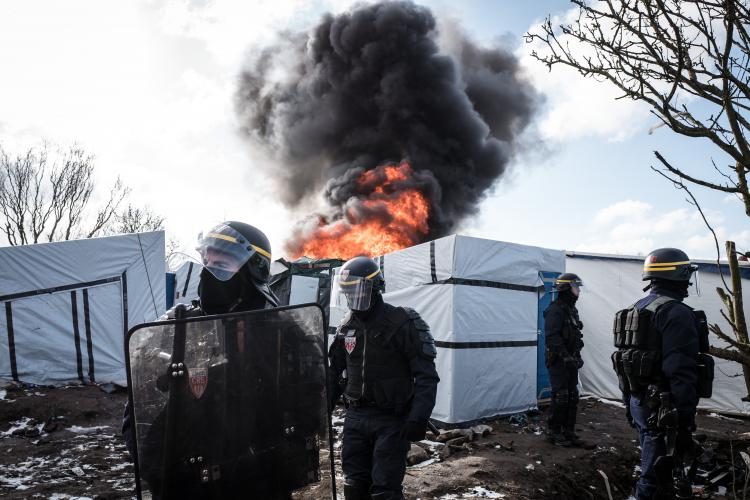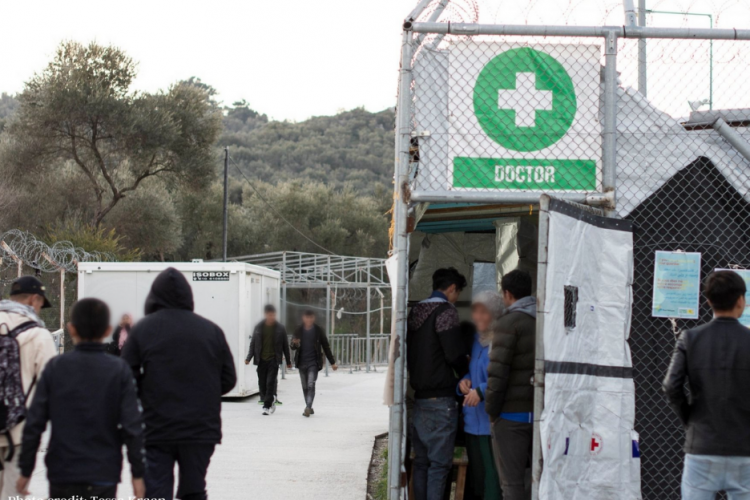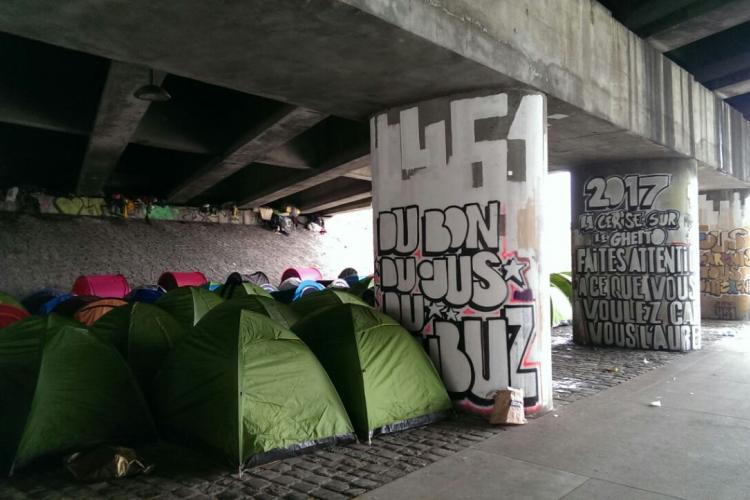Movements, Mobilities and the Politics of Exhaustion in Europe During Covid-19
Posted:
Time to read:
Guest post by Dr Marta Welander. Marta is a critical border and migration scholar and activist. In this blog, she discusses how a set of insidious, temporal, and corporeal technologies of bordering, which she refers to as the ‘politics of exhaustion,’ have been exacerbated during Covid-19 in Europe. This is the eleventh and final post in Border Criminologies themed series on 'Everyday Violence and Resistance in Europe’s ‘Migration Management’ During the Covid-19 Pandemic', organised by Dr Marta Welander and Dr Susanne Jaspars.
The past years have witnessed a trend of ever-increasing funding allocations for restrictive border management practices across Europe. This includes the externalisation of asylum responsibilities through ‘cooperation’ with third countries, as well as illegal pushbacks of people on the move at internal and external European borders. Individuals arriving in Europe from countries plagued by instability and uncertainty – and who have experienced conflict, violence, persecution or extreme poverty– oftentimes find themselves trapped in harmful borderzones. They find themselves criminalised for searching a new and safe life.
The politics of exhaustion
Importantly, in these borderzones, restrictions reliant on confinement, bordering fences, violent pushbacks and deportation, have now been complemented by the introduction of more insidious, temporal, and corporeal technologies of bordering. These, as I have argued, consist of an array of bordering tactics which are devised to render migrants’ lives governable and pliant; their bodies docile. These practices differ from one context to another, and typically involve a combination of the following sets of (micro) practices: (1) recurring and ritualised direct violence (beatings, rubber bullets, tear gas exposure, including its indiscriminate use, regular pepper spraying); (2) Acts of humiliation, dehumanisation, and racialisation (verbal abuse including racial slurs, shouting, heckling, abusive or degrading language, shoe confiscation, shoving, and commanding of nonsensical obedience); (3) Withdrawal or denial of adequate state care (coupled with the hampering of grassroots distributions) which produces preventable vulnerabilities; (4) Acts of dispossession (regular destruction and ruthless slashing of tents, confiscation of tents, sleeping bags, and blankets, basic necessities such as drinking water, mobile phones, and personal paperwork); (5) Shrinking of access to space through erection of fences, razor wire, spikes, specifically targeting people’s resting spots and communal spaces (‘hostile architecture’); (6) Forced (im)mobility used to one the one hand confine or detain individuals attempting to move forward, while on the other hand, forcing mobility through dispersals, removals, and deportation (convoluting journeys and delaying recourse to an effective solution); (7) Production of uncertainty, undercurrents of threats, and an omnipresence of death mean that even in the absence of physical violence, individuals are waiting anxiously for violence to recur, leading to constant hiding and caution.

These various practices converge to negate personal autonomy; agency, wellbeing and self-efficacy with the underlying intention of dissuading people and influencing decisions regarding onward movement through physical, mental, and/or emotional exhaustion. Indeed, when sustained over time, these practices are best understood collectively as constituting an entire strategic state approach, rather than being isolated or incidental undertakings by state actors. An Iranian man I once interviewed in Calais succinctly summarised the notion as follows: “If they don’t want us here, why don’t they just get rid of us once and for all? I think they’re trying to make us tired so that we choose to return home or choose to go somewhere else. Otherwise, it wouldn’t make any sense for them to be doing what they are doing.” A long-term volunteer from the Calais area similarly suggested: “I imagine one thing [the authorities are] trying to achieve was to make us feel confused and tired. Like the point was to make things completely unpredictable, and this really wears you down. […] Yeah, they drove us into exhaustion.” I refer to such state practices – which neither lead to immediate deportation, detention or death but rather the slow grinding down of resilience as the ‘politics of exhaustion’; a concept which I first developed in collaboration with my colleague Leonie Ansems de Vries, the Chair of the Migration Research Group at King’s College London.
An exacerbation of the politics of exhaustion during Covid
During the Covid-19 pandemic, the intensity of the politics of exhaustion has been heightened, with new forms of everyday aggressions, exclusions and intentional neglect targeting migrants across Europe’s borderlands and host countries. Indeed, it has been widely demonstrated that the Covid-19 crisis gave rise to disconcerting attempts by governments to utilise the pandemic as a pretext for suspending the human rights of people on the move through border closures, halted or modified asylum procedures, and so on.
In Greece, the government utilised the pretext of Covid to suspend the right to claim asylum for thirty days in March 2020 in direct contravention of the 1951 Refugee Convention and it publicised the use of ‘immediate deportation’ - removing an individual’s right to register an asylum request. Though this ban was not extended past the thirty-day period due to significant international pressure, it demonstrated the Government’s intentions of leveraging the Covid situation to curb migration and enact deportations and was followed by many other deplorable examples. Similarly, in Belgium, an extraordinary online pre-registration procedure was introduced in April 2020, to carry out asylum registration in a ‘safe and structured manner’ during Covid. This – as Lukas Kestens argues – led to hundreds of asylum seekers being left on the streets without registration nor shelter, despite having been initially justified as a way.

At the French-Italian border, refugees and displaced people in transit have been facing critical conditions for years. With the onset of the Covid-19 pandemic, the situation further deteriorated services. Covid-related restrictions prevented organisations and solidarity groups from operating in the area and providing essential services and assistance during periods of the pandemic, while a new French-Italian police agreement signed in December 2020 focused on preventing border crossings by increasing controls and containment on the Italian territory. The acute impact of the pandemic has been felt across key areas by people on the move here, their risks increased as access to adequate shelter, medical care, protection, and the treatment and respect for rights at borders decreased. As such, it is evident that while the pandemic presented a crucial opportunity to acknowledge the need for to shelter, healthcare and protection in Ventimiglia and other locations along the French-Italian border, it merely exacerbated a deplorable situation further.

In the UK, as outlined by Susanne Jaspars in her post in this series, the vast range of ‘everyday cruelties’ experienced by Sudanese (and other) asylum seekers in the UK intensified throughout the Covid-19 pandemic remote legal assistance, and slow Home Office procedures make it difficult to claim asylum, and limits access to health care, worsened by poor food and limited cash assistance and social isolation, essentially putting lives at risk.
In northern France, at the UK-France border, where people on the move have for many years struggled to survive in the informal settlements of Calais and Grande-Synthe, daily existence became even harder during the Covid period. People’s daily lives continued to be characterised by: evictions of informal living spaces (1,287 evictions recorded in 2021 alone); confiscation of shelters (10,121 confiscations of tents and tarps, 3,751 sleeping bags and 630 bags recorded in 2021), continuous police violence (127 instances witnessed and documented in 2021), arrests (205 documented in 2021) and various additional forms of violence and violations of fundamental rights, with insufficient and intermittent access to food, shelter, water, information, etc., the Covid-19 pandemic further reinforced people’s acute vulnerability and urgent need of protection. Despite the French state announcing some limited measures for the protection of displaced people, little has changed in the discriminatory practices recorded here throughout the pandemic.
By denying adequate sanitation facilities and safe accommodation, the authorities have ensured that people in the area are faced with a further exacerbated and arguably even more exhausting situation. This also produces a ‘self-fulfilling prophecy’; the politics of exhaustion can be understood as co-producing de facto situations of deportability and terrible humanitarian conditions which warrant the demolition and eviction of settlements based on sanitary arguments, whilst sometimes also co-producing migrant ‘deviancy’ and violent behaviours, used in turn to justify the already deployed harm-inducing politics of exhaustion – through what David Keen refers to as a ‘legitimisation of suffering.’
Politics of exhaustion as experienced by people on the move
When I interviewed individuals in 2016-2019 who had arrived in the UK after many years being trapped in harmful borderzones, many cited precisely the notion of being physically and mentally exhausted. One woman from East Africa explained how she felt when arriving in the UK via a lorry after years in the UK-France borderzone: “I just slept and slept and

Resistance to the politics of exhaustion
The politics of exhaustion has intensified during the Covid-19 pandemic. The brutality and harmful impact that seemingly small and everyday acts of violence have on the bodies and minds of people on the move, ought to be called out for what it is and condemned as state violence. Countering the politics of exhaustion is difficult because everyday violent tactics are characterised by an absence of clearly defined and identifiable ‘human culprits,’ an apparent absence of intent to cause harm by governments. This insidious nature surrounding the politics of exhaustion helps European states to sanitise and invisibilise violence, as well as depoliticise the suffering experienced by thousands of people on their territory.

Despite this, the Covid-19 period has witnessed a multitude of ways in which people on the move have responded to; resisted and partially circumvented the technologies of everyday violence at borders. By the same token, activists, civil society groups and other allies have continued to challenge and counter the politics of exhaustion across Europe. For instance, as we read in Soline Ballet’s Border Criminologies blog, different grassroots initiatives in Brussels started, adapted and increased their practices in providing accommodation for ‘illegalised’ migrants in transit during the Covid-19 pandemic.. Similarly, we learn through Dalal Rajab’s blog post how a Sudanese migrant-led initiative has helped to counter certain effects of ‘everyday violence’ through self-empowerment and by building bridges across society during Covid-19 and beyond. In Greece and across Europe, the grassroots movement Europe Must Act worked relentlessly throughout the pandemic to call out everyday violence and harmful border control practices, and continue to do so today. In northern France, grassroots groups and activist movements monitor police violence and provide humanitarian aid in the face of the politics of exhaustion. These examples, and others, allow us to envisage new imaginaries and possibilities within borderzones which are otherwise characterised by stringent state control. This, arguably, opens powerful ways to think of spaces for resistance and to re-imagine borders and how we welcome people seeking sanctuary in Europe.
Any comments about this post? Get in touch with us! Send us an email, or post a comment here or on Facebook. You can also tweet us.
__________
How to cite this blog post (Harvard style)
Welander, M. (2022) Movements, Mobilities and the Politics of Exhaustion in Europe During Covid-19. Available at: https://www.law.ox.ac.uk/research-subject-groups/centre-criminology/centreborder-criminologies/blog/2022/03/movements [date]
Share:








